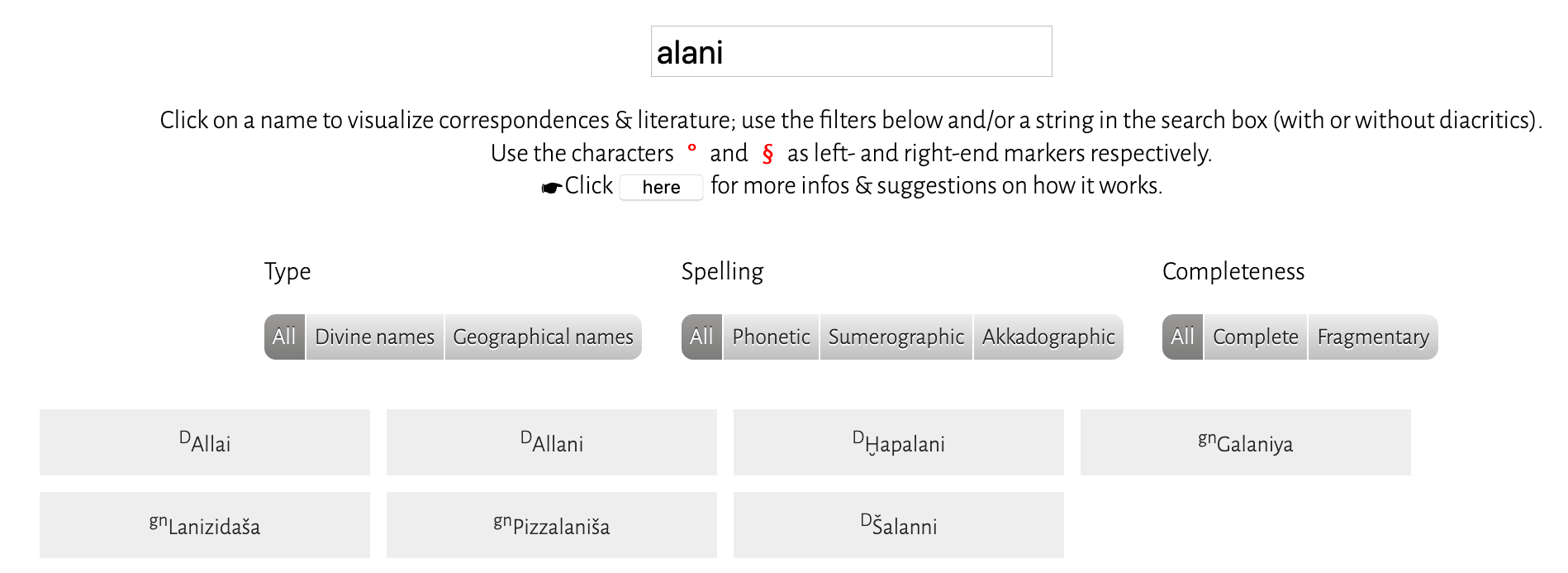The database consists of a list of names which can be filtered and searched, each one provided with a set of metadata. The name forms displayed in the grid items visible to the user correspond to normalized spellings of the attested forms. When two or more normalized spellings are thought to represent variants of one and the same name, one of them is arbitrarily considered as the “primary” form while the other one(s) are marked as “secondary” forms. By clicking on the grid items detail infos are displayed in a pop-up window, including the indication of whether the name is treated as a secondary form or not. NB: the literature is booked at the primary entry only, so for retrieving literature on e.g. “Kantiputti” one needs to look after the relevant primary form, in this case “Kantipuitti.”
“Correspondences” between two or more different names are noted in the detail info and can be displayed by clicking on the various grid items. E.g. for ALLATUM the following correspondences are listed: Allani, EREŠ.KI.GAL, and UTU URUArinna.
For each name, the following spellings are listed as tags in the background (not visible to the user): the name as displayed in the grid item, the “primary form” and the “correspondences” (if present), and alphabetized writings of the Hittite phonetic spellings (i.e. without geminated consonants and with p/t/k for b/d/g). All these tagged spellings are noted both with and without diacritics. Each one is provided with a “°” and a “§” symbol at its beginning and at its end respectively. Thus in the case of “10-(šu)b” (primary reading: none, correspondences: “Teššub”) the following spellings are listed as tags: °10šub§, °teššub§, °10sub§, °tessub§, °tesup§, and °10sup§.
The names in the grid can be sorted out by using the buttons pertaining to the categories “Type”, “Spelling”, and “Completeness”; in addition, they can be searched by typing a string in the “Search” box.
Based on the above specifications, in order to optimize the search results it is conducive to look for a certain text string, typed as “alphabetized” if Hittite (i.e. without geminate consonants, and with k/p/t instead of g/b/d), and to make use of the left- and end-markers when appropriate.
For example, searching after “alani” gives all names containing that string (with or without geminated consonants) …

… while by adding the end-marker “§” one finds out the names ending in “-alani” (or -allani, or -allanni, or -alanni):

Another example: the DN “Agaššari” can be retrieved by searching either for “agaššari”, “agassari”, or “akasari” (or segments of these spellings), but note that a search after “agasari” will give no results.
The list of personal names is limited to those present in the current version of the corresponding database (see here).
… enjoy!